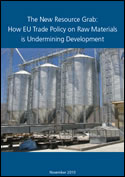EU’s new grab for raw materials will increase poverty

Traidcraft | November 2010
EU’s new grab for raw materials will increase poverty
The European Union’s push to help its companies access raw materials in developing countries will increase poverty, according to a new report released today.
The EU’s Raw Materials Initiative, on which the European Commission is due to comment later this month, heralds a new bid for raw materials such as platinum, rare earths, wood and hides and skins.
Brussels argues that these materials are essential to develop the EU’s future industrial competitiveness. However, the trade policies [1] accompanying the initiative will impoverish poor countries. Specifically:
The EU wants to curb the ability of developing countries to restrict the exports of their raw materials. Yet many developing countries need the taxes on these raw materials exports to develop their local industry, raise revenue or protect the environment.
The EU is also negotiating new investment rules with poor countries to secure European companies unprecedented access to raw materials on the same or even better terms as local businesses. This will make it more difficult for developing countries to regulate investment to promote local development.
The report – The New Resource Grab: How EU Trade Policy on Raw Materials is Undermining Development – was commissioned by a coalition of European NGOs working on trade issues in the developing world.
The UK member of the coalition, Traidcraft Exchange’s Director of Policy, Paul Spray said: “At best, the EU’s strategy stops governments from using sensible development policies; at worst, it looks like a traditional grab for raw materials, part of a new scramble for Africa.”
Trade development expert Mark Curtis, the author of the report, said: “Our research shows that in Kenya, for example, export taxes on raw hides and skins from cattle have developed the leather sector, creating seven thousand new jobs, increasing incomes for another 40,000 people and boosting earnings from the sector by almost € 8 million. Despite this, the EU is demanding restrictions on the use of export taxes in Kenya, as elsewhere.”
The study shows that EU strategy is being driven by European businesses which want access to cheap raw materials. It faces mounting opposition from many developing countries, which are trying to preserve the right to use export taxes and have long opposed negotiating investment agreements with the EU. Companies working in the raw materials sector, especially mining companies, already have notoriously poor records on respecting human rights. Yet the EU is pushing for comprehensive investment liberalisation with ‘maximum protection for EU investors’.
The EU’s proposed investment policies could facilitate land-grabbing, discourage governments from establishing environmental regulations, and curb governments’ ability to enact tax policies to raise revenues and nurture local industry.
The Raw Materials Initiative is also likely to reinforce Europe’s own dependence on raw materials. The average European already consumes three times as many resources as the average Asian and more than four times as much as the average African. Europe has become more dependent on imported resources than any other region in the world. Although the initiative addresses recycling, pushing for ever greater access to the world’s raw materials is a distraction from reducing Europe’s existing consumption of them.
The study calls for the EU to stop promoting this unilateral initiative and instead to promote an international process for the equitable use of the world’s limited natural resources. Brussels should stop demanding curbs on export taxes and allow developing countries to regulate foreign investment in their own interest.
The New Resource Grab: How EU Trade Policy on Raw Materials is Undermining Development, is published by Traidcraft Exchange, Oxfam-Germany, AITEC-France, WEED-Germany and Comlamh-Ireland and is available as a downloadable document.
For more information from Traidcraft contact: Peter Collins on 0191 4976465 or by email at peterc@traidcraft.co.uk
NOTES FOR EDITORS:
The Raw Materials Initiative, launched in 2008 by the European Commission, stressed the EU’s dependence on ‘strategically important raw materials’ such as ‘high-tech’ metals like platinum, rare earths and titanium and others such as wood, chemicals and hides and skins. The key barrier to accessing these materials was the ‘proliferation of government measures that distort international trade in raw materials’, notably export taxes and ‘restrictive investment rules’. The countries applying these measures were China, Russia, Ukraine, Argentina, South Africa and India, and other developing countries in resource-rich Africa and South America.
Export taxes are applied by over 70 countries and are perfectly legal under the World Trade Organisation rules. By restricting exports, they provide an incentive to using raw materials locally to develop processing industries, thus helping to develop competitive manufacturing companies and allowing developing countries to escape their dependence on raw materials exports.





